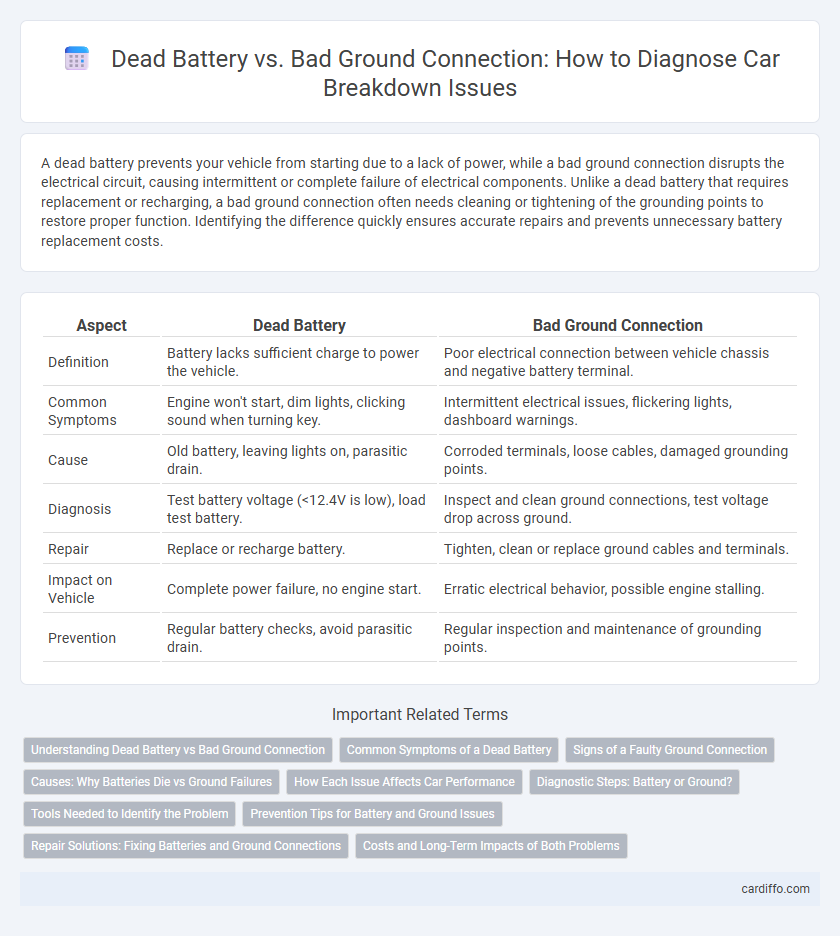A dead battery prevents your vehicle from starting due to a lack of power, while a bad ground connection disrupts the electrical circuit, causing intermittent or complete failure of electrical components. Unlike a dead battery that requires replacement or recharging, a bad ground connection often needs cleaning or tightening of the grounding points to restore proper function. Identifying the difference quickly ensures accurate repairs and prevents unnecessary battery replacement costs.
Table of Comparison
| Aspect | Dead Battery | Bad Ground Connection |
|---|---|---|
| Definition | Battery lacks sufficient charge to power the vehicle. | Poor electrical connection between vehicle chassis and negative battery terminal. |
| Common Symptoms | Engine won't start, dim lights, clicking sound when turning key. | Intermittent electrical issues, flickering lights, dashboard warnings. |
| Cause | Old battery, leaving lights on, parasitic drain. | Corroded terminals, loose cables, damaged grounding points. |
| Diagnosis | Test battery voltage (<12.4V is low), load test battery. | Inspect and clean ground connections, test voltage drop across ground. |
| Repair | Replace or recharge battery. | Tighten, clean or replace ground cables and terminals. |
| Impact on Vehicle | Complete power failure, no engine start. | Erratic electrical behavior, possible engine stalling. |
| Prevention | Regular battery checks, avoid parasitic drain. | Regular inspection and maintenance of grounding points. |
Understanding Dead Battery vs Bad Ground Connection
A dead battery typically results from a lack of charge, preventing the vehicle from starting due to insufficient electrical power. A bad ground connection disrupts the electrical circuit by impeding proper current flow, causing intermittent or complete failure of the vehicle's electrical systems. Diagnosing between a dead battery and a bad ground connection involves testing voltage levels and continuity to ensure accurate identification and effective vehicle repair.
Common Symptoms of a Dead Battery
Common symptoms of a dead battery include dim headlights, slow engine crank, and a clicking sound when turning the key. Electrical components such as the radio and dashboard lights may fail to power on or operate intermittently. These signs distinguish a dead battery from issues caused by a bad ground connection, which typically result in fluctuating electrical performance rather than a complete power loss.
Signs of a Faulty Ground Connection
A faulty ground connection in a vehicle often causes symptoms like dim or flickering headlights, erratic dashboard lights, and difficulty starting the engine despite a fully charged battery. Corrosion or loose wires at grounding points can disrupt electrical flow, leading to intermittent power loss and malfunctioning electronic components. Unlike a dead battery, these signs indicate electrical grounding issues that require thorough inspection and cleaning of the ground cables and connections.
Causes: Why Batteries Die vs Ground Failures
Batteries die primarily due to factors such as age, extreme temperatures, parasitic drain, and faulty charging systems that prevent proper voltage replenishment. Ground connection failures often result from corrosion, loose or damaged cables, and poor electrical contact, which disrupt the flow of current and cause intermittent or complete electrical failures. Understanding these distinct causes helps diagnose vehicle breakdowns by distinguishing between power loss from battery depletion and electrical issues arising from grounding faults.
How Each Issue Affects Car Performance
A dead battery prevents the engine from starting and disables electrical components like lights and the radio, causing a complete power failure. A bad ground connection results in intermittent electrical problems, such as flickering lights or erratic sensor behavior, leading to poor engine performance and unreliable vehicle operation. Both issues disrupt the car's electrical system but affect performance and drivability in distinctly different ways.
Diagnostic Steps: Battery or Ground?
To diagnose a dead battery versus a bad ground connection, first check battery voltage with a multimeter, ensuring it reads around 12.6 volts for a fully charged battery. Next, inspect battery terminals and cables for corrosion or looseness, which can mimic a dead battery symptom. Finally, test ground connections by measuring resistance between the battery negative terminal and chassis, where a high resistance indicates a poor ground causing electrical issues.
Tools Needed to Identify the Problem
To identify a dead battery or a bad ground connection, essential tools include a multimeter for measuring voltage and continuity, and a battery load tester to assess battery health under stress. A test light can quickly verify grounding issues, while insulated wrenches help safely disconnect terminals. Using these tools ensures accurate diagnosis and efficient resolution of automotive electrical breakdowns.
Prevention Tips for Battery and Ground Issues
Ensuring a clean and secure battery terminal connection prevents voltage drops caused by corrosion or loose contacts. Regularly inspecting and tightening ground connections reduces the risk of electrical malfunctions and starting issues. Using dielectric grease on terminals inhibits corrosion and maintains optimal battery performance.
Repair Solutions: Fixing Batteries and Ground Connections
Repairing a dead battery typically involves jump-starting, recharging, or replacing the battery to restore optimal power supply. Fixing a bad ground connection requires cleaning, tightening, or replacing corroded or loose grounding cables to ensure proper electrical flow. Both solutions improve vehicle starting performance and prevent electrical system malfunctions.
Costs and Long-Term Impacts of Both Problems
A dead battery often incurs immediate replacement costs averaging $100 to $200, with potential towing services adding to the expense; frequent battery failures can also strain the vehicle's electrical system, leading to more extensive repairs over time. A bad ground connection might initially seem inexpensive to fix, typically under $150 for diagnostics and repairs, but unresolved grounding issues cause erratic electrical behavior, accelerating wear on components like the alternator and onboard computers, resulting in higher long-term maintenance costs. Both problems threaten vehicle reliability, yet persistent bad ground issues tend to have more severe cascading effects on electrical system health, increasing overall repair expenses and reducing vehicle lifespan.
Dead battery vs bad ground connection Infographic

 cardiffo.com
cardiffo.com